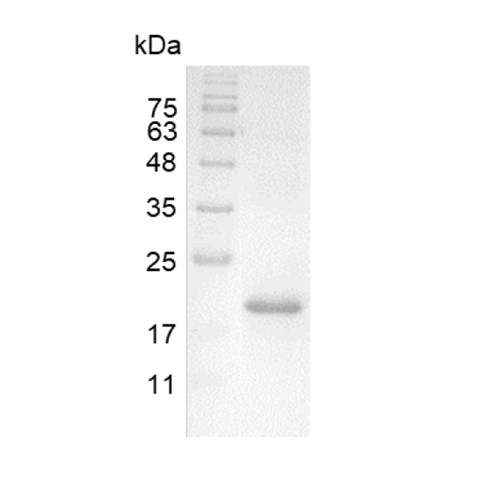| Background |
Interleukin-10 (IL-10), also known as human cytokine synthesis inhibitory factor (CSIF), is an anti-inflammatory cytokine. Many different types of cells can produce IL-10, including immune cells and non-immune cells. IL-10 exerts inhibitory functions on DCs and macrophages, which is a potent inhibitor of antigen presentation and limit the production of the Th1-associated cytokines IL-2 and interferon-γ (IFN-γ). IL-10 is also a key immunoregulator during infection due to its inhibitory effect on inflammatory cytokine production. Consequently, the excessive Th1 and CD8+ T cell responses could be suppressed during infection. |
| Synonyms |
interleukin 10, B-TCGF, CSIF, TGIF, IL10 |
| Uniprot ID |
P22301 |
| Molecular Weight |
The protein has a calculated MW of 19.6 kDa.
The protein migrates as 20 kDa under reducing condition (SDS-PAGE analysis). |
| Expression System |
Escherichia coli |
| Purity |
>98% as determined by SDS-PAGE analysis. |
| Activity |
Measure by its ability to induce MC/9‑2 cells proliferation. The ED₅₀ for this effect is <1 ng/mL. The specific activity of recombinant human IL-10 is approximately >1x10⁶ IU/ mg. |
| Endotoxin Level |
<0.05 EU per 1 μg of the protein by the LAL method. |
| Protein Sequence |
MSPGQGTQSENSCTHFPGNLPNMLRDLRDAFSRVKTFFQMKDQLDNLLLKESLLEDFKGYLGCQALSEMIQFYLEEVMPQAENQDPDIKAHVNSLGENLKTLRLRLRRCHRFLPCENKSKAVEQVKNAFNKLQEKGIYKAMSEFDIFINYIEAYMTMKIRN with polyhistidine tag at the C-terminus |
| Protein Tag |
His Tag (C-term) |
| Form |
Lyophilized from a 0.2 µm filtered solution of PBS, pH 8.0. |
| Application |
Cell Culture |

 No references are available
No references are available
 Follow Us
Follow Us